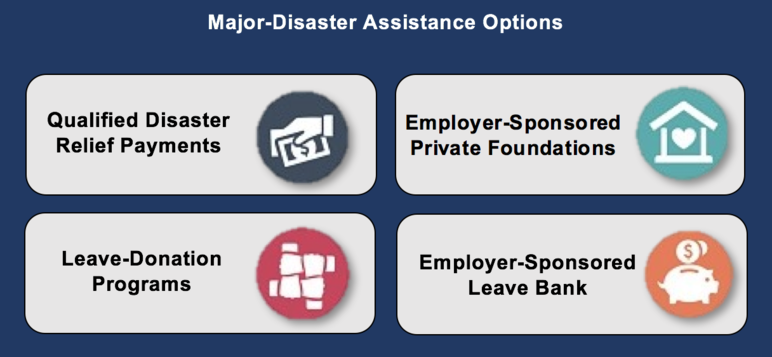Options for Providing Major-Disaster Assistance to Employees
In light of Hurricanes Harvey and Irma, employers and their employees may be looking for ways to provide assistance to those within their organization affected by these devastating storms. Fortunately, the IRS provides several ways support can be given on a tax-advantaged basis.

1. Qualified Disaster Relief Payments
Section 139 of the Internal Revenue Code (“Code”) allows employers to provide tax-free relief payments to individuals affected by a “qualified disaster.” A qualified disaster includes any disaster resulting from terroristic or military action, a federally declared disaster, a disaster involving a common carrier, or any other event determined by the Secretary of the Treasury to be of a catastrophic nature. See Code Section 139(c).
“Qualified disaster relief payments” include any amount paid to or for the benefit of an individual:
- To reimburse or pay reasonable and necessary personal, family, living, or funeral expenses incurred as a result of a qualified disaster; or
- To reimburse or pay reasonable and necessary expenses incurred for the repair or rehabilitation of a personal residence or its contents caused by a qualified disaster. See Code Section 139(b).
Qualified disaster relief payments do not include payments for expenses otherwise paid for by insurance or other reimbursements, or income replacement payments, such as payments for lost wages, business income, or unemployment compensation.
The IRS has made the application and administration of qualified disaster relief payments quite flexible. These payments are not subject to income tax, employment taxes, or information reporting requirements and can be made by both employers and employees. Furthermore, there are no substantiation requirements so long as reasonable steps are taken to ensure that the grant amounts are reasonably expected to be commensurate with the amount of unreimbursed reasonable and necessary expenses caused by the qualified disaster. See Rev. Rul. 2003-12.
Companies can deduct qualified disaster relief payments under Code Section 139 without the administrative burden of establishing a charitable foundation under Code Section 501(c)(3).
2. Employer-Sponsored Private Foundations
For employers, few options provide the administrative flexibility and tax benefits of direct “qualified disaster relief payments,” but for employees wishing to contribute to the relief effort, there may be more tax-advantaged strategies. An employer-sponsored private foundation can offer the same kind of tax-free, charitable relief but with the added benefit of providing a tax deduction for individual employees who contribute.
Employer-sponsored private foundations were historically prevented from providing assistance to employees of the sponsor, but in 2001 Congress created an exception for payments to employees affected by a “qualified disaster,” as defined in Section 139, as long as certain self-dealing safeguards are in place. The IRS will presume that the payments are consistent with the foundation’s charitable purpose and free from self-dealing if:
- The class of beneficiaries is large;
- The recipients are selected based on an objective determination of need; and
- The selection is made by an independent selection committee or through a substitute procedure that ensures any benefit to the employer is tenuous or incidental. See IRS Publication 3833.
Additionally, programs cannot be used to induce employees to follow a course of action sought by the employer or designed to relieve the employer of a legal obligation to provide employee benefits.
Employer-sponsored private foundations must register as tax-exempt charitable organizations and comply with specific documentation requirements and other restrictions. Although less flexible than direct “qualified disaster relief payments,” employer-sponsored private foundations may be attractive to some companies because of the added tax benefits realized by individual employee contributors.
3. Leave-Donation Programs
In Notices 2017-48 and 2017-52, the IRS provided guidance on one of the ways employees can donate their leave to provide assistance to individuals affected by Hurricanes Harvey and Irma. Under this method, employers may set up a program where employees can donate their accrued vacation, sick, or personal leave in exchange for equivalent cash donations made by employers to Section 170(c) organizations, such as the employer-sponsored private foundations discussed above, for the relief of Hurricanes Harvey and Irma victims. This method is available through January 1, 2019. The IRS provides that employees will be exempt from tax on the forgone income and employers may claim those payments as charitable contributions under Section 170(c) (subject to the applicable limitations) or as business expenses under Section 162. The IRS also ensured that giving employees the choice to participate in an employer-sponsored leave-donation program would not be considered constructive receipt of income. See Notice 2017-48, 2017-39 IRB; Notice 2017-52, 2017-40 IRB.
This method allows employees to contribute to the relief effort without facing any related tax consequences. Employers benefit by deducting the payments as charitable contributions or business expenses and reducing their FICA tax liability.
4. Employer-Sponsored Leave Banks
Employers may also set up leave banks that allow employees to deposit their accrued vacation, sick, or personal leave for use by employees adversely affected by a major disaster. An employee is regarded as adversely affected by a major disaster if the disaster caused severe hardship to the employee or the employee’s family that requires the employee to be absent from the workplace. A written leave-sharing plan has to meet certain requirements to be considered a bona fide employer-sponsored leave bank. See Notice 2006-59, 2006-2 CB 60.
Under this method, donee employees who use the donated leave to address major-disaster-related issues would be taxed on the additional compensation received through this program and donor employees would not be subject to tax liability on their donated leave.
Other Options:
Given the magnitude of the damage caused by these powerful storms, charitable assistance alone may be inadequate for many employees. To access cash quickly, those affected by Hurricanes Harvey and Irma may have the option of taking hardship withdrawals or loans from their 401(k) plans. The IRS has waived many of the administrative requirements related to hardship distributions, making it quicker and easier for affected employees to withdraw cash from their retirement plans — but keep in mind, the distribution amounts will still be includable in gross income and the normal early-withdrawal penalty still applies.
Alvarez & Marsal Taxand Says:
While the effects of Hurricanes Harvey and Irma will be felt for years to come, many employees need immediate help today. Knowing the options for providing major-disaster relief assistance to employees can help you choose the most effective and tax-efficient strategy for your organization and those employees who wish to contribute to the relief efforts. If you are interested in establishing a program to provide major-disaster relief to employees — whether to address current employee needs or to be prepared for the future — contact the A&M Compensation and Benefits team to learn more.
Disclaimer
The information contained herein is of a general nature and based on authorities that are subject to change. Readers are reminded that they should not consider this publication to be a recommendation to undertake any tax position, nor consider the information contained herein to be complete. Before any item or treatment is reported or excluded from reporting on tax returns, financial statements or any other document, for any reason, readers should thoroughly evaluate their specific facts and circumstances, and obtain the advice and assistance of qualified tax advisers. The information reported in this publication may not continue to apply to a reader's situation as a result of changing laws and associated authoritative literature, and readers are reminded to consult with their tax or other professional advisers before determining if any information contained herein remains applicable to their facts and circumstances.
About Alvarez & Marsal Taxand
Alvarez & Marsal Taxand, an affiliate of Alvarez & Marsal (A&M), a leading global professional services firm, is an independent tax group made up of experienced tax professionals dedicated to providing customized tax advice to clients and investors across a broad range of industries. Its professionals extend A&M's commitment to offering clients a choice in advisers who are free from audit-based conflicts of interest and bring an unyielding commitment to delivering responsive client service. A&M Taxand has offices in major metropolitan markets throughout the United States and serves the United Kingdom from its base in London.
Alvarez & Marsal Taxand is a founder of Taxand, the world's largest independent tax organization, which provides high quality, integrated tax advice worldwide. Taxand professionals, including almost 400 partners and more than 2,000 advisers in 50 countries, grasp both the fine points of tax and the broader strategic implications, helping you mitigate risk, manage your tax burden and drive the performance of your business.
To learn more, visit www.alvarezandmarsal.com or www.taxand.com




